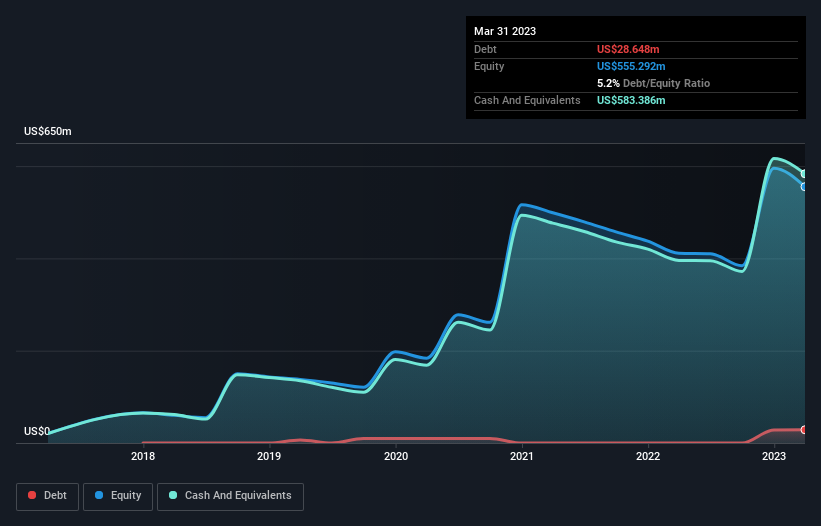Howard Marks put it nicely when he said that, rather than worrying about share price volatility, 'The possibility of permanent loss is the risk I worry about... and every practical investor I know worries about.' So it might be obvious that you need to consider debt, when you think about how risky any given stock is, because too much debt can sink a company. As with many other companies Replimune Group, Inc. (NASDAQ:REPL) makes use of debt. But the real question is whether this debt is making the company risky.
Why Does Debt Bring Risk?
Debt assists a business until the business has trouble paying it off, either with new capital or with free cash flow. If things get really bad, the lenders can take control of the business. However, a more usual (but still expensive) situation is where a company must dilute shareholders at a cheap share price simply to get debt under control. Of course, plenty of companies use debt to fund growth, without any negative consequences. When we think about a company's use of debt, we first look at cash and debt together.
View our latest analysis for Replimune Group
How Much Debt Does Replimune Group Carry?
As you can see below, at the end of March 2023, Replimune Group had US$28.6m of debt, up from none a year ago. Click the image for more detail. But on the other hand it also has US$583.4m in cash, leading to a US$554.7m net cash position.

A Look At Replimune Group's Liabilities
We can see from the most recent balance sheet that Replimune Group had liabilities of US$33.8m falling due within a year, and liabilities of US$57.5m due beyond that. On the other hand, it had cash of US$583.4m and US$2.94m worth of receivables due within a year. So it actually has US$495.0m more liquid assets than total liabilities.
This luscious liquidity implies that Replimune Group's balance sheet is sturdy like a giant sequoia tree. On this view, lenders should feel as safe as the beloved of a black-belt karate master. Simply put, the fact that Replimune Group has more cash than debt is arguably a good indication that it can manage its debt safely. The balance sheet is clearly the area to focus on when you are analysing debt. But ultimately the future profitability of the business will decide if Replimune Group can strengthen its balance sheet over time. So if you want to see what the professionals think, you might find this free report on analyst profit forecasts to be interesting.
Since Replimune Group doesn't have significant operating revenue, shareholders may be hoping it comes up with a great new product, before it runs out of money.
So How Risky Is Replimune Group?
Statistically speaking companies that lose money are riskier than those that make money. And in the last year Replimune Group had an earnings before interest and tax (EBIT) loss, truth be told. And over the same period it saw negative free cash outflow of US$130m and booked a US$174m accounting loss. But at least it has US$554.7m on the balance sheet to spend on growth, near-term. Overall, its balance sheet doesn't seem overly risky, at the moment, but we're always cautious until we see the positive free cash flow. When analysing debt levels, the balance sheet is the obvious place to start. But ultimately, every company can contain risks that exist outside of the balance sheet. We've identified 4 warning signs with Replimune Group (at least 1 which shouldn't be ignored) , and understanding them should be part of your investment process.
Of course, if you're the type of investor who prefers buying stocks without the burden of debt, then don't hesitate to discover our exclusive list of net cash growth stocks, today.
New: AI Stock Screener & Alerts
Our new AI Stock Screener scans the market every day to uncover opportunities.
• Dividend Powerhouses (3%+ Yield)
• Undervalued Small Caps with Insider Buying
• High growth Tech and AI Companies
Or build your own from over 50 metrics.
Have feedback on this article? Concerned about the content? Get in touch with us directly. Alternatively, email editorial-team (at) simplywallst.com.
This article by Simply Wall St is general in nature. We provide commentary based on historical data and analyst forecasts only using an unbiased methodology and our articles are not intended to be financial advice. It does not constitute a recommendation to buy or sell any stock, and does not take account of your objectives, or your financial situation. We aim to bring you long-term focused analysis driven by fundamental data. Note that our analysis may not factor in the latest price-sensitive company announcements or qualitative material. Simply Wall St has no position in any stocks mentioned.
About NasdaqGS:REPL
Replimune Group
A clinical-stage biotechnology company, focuses on the development and commercialization of oncolytic immunotherapies to treat cancer.
Excellent balance sheet with low risk.
Market Insights
Community Narratives




